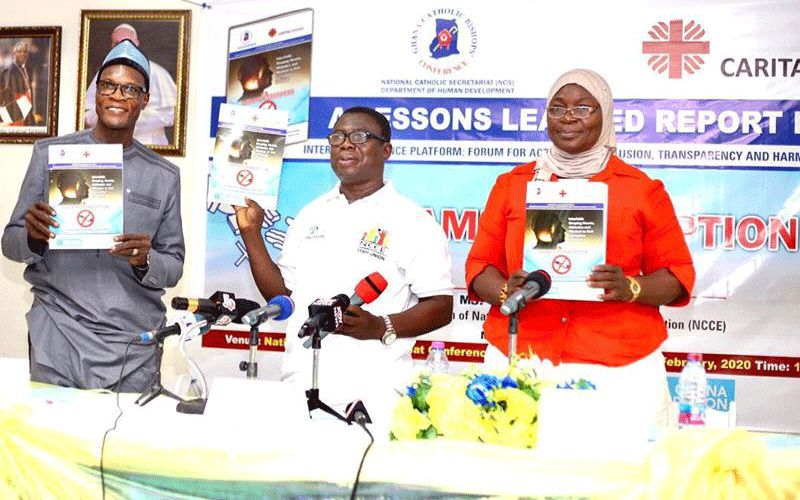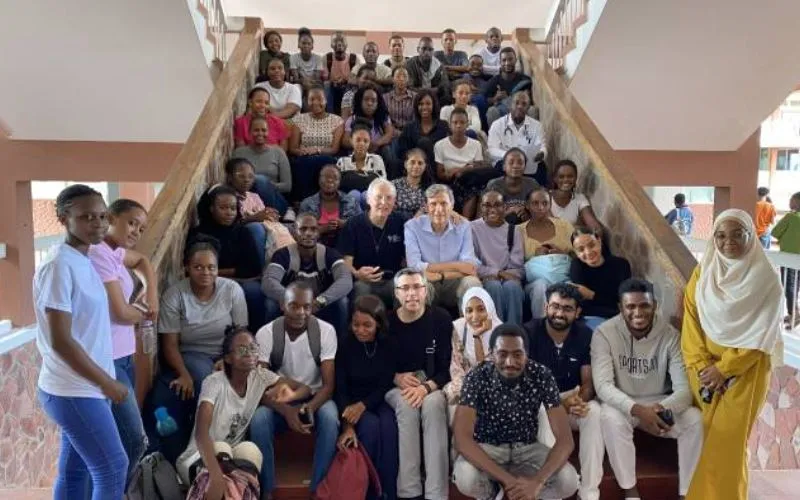I-SHAME Corruption in Ghana Project, he noted, has made “a significant contribution towards the elimination of the fundamental causes of corruption in Ghana by investing in structures and systems that put integrity building and morality at the heart of the upbringing of Basic School Children in Ghana.”
According to the Caritas Ghana official, there was need to track the progress of members of the Integrity Club to finally arrive at the general performance of the anti-graft tool in schools.
“In view of the fact that character formation and integrity building require a substantial period of time to achieve, it will be premature to measure impact within the short-term. Therefore, urgent steps should be taken to ensure that there is systematic tracking of progress of Integrity Club members and their contribution towards the fight against corruption through a well-defined tracer intervention,” he said.
He added, “The impact of the I-SHAME Corruption in Ghana project can be assessed over a long-term and only when pupils from the Integrity Clubs have grown into adults and are engaged in gainful employment or in economic activities.”
In the light of the positive lessons documented, Zan Akologo recommended to policy makers, the Ghana Education Service, development partners and the civil society as a way forward in the collective fight against bribery and corruption in Ghana to consider the lessons learnt from the project.
(Story continues below)
I-SHAME Corruption in Ghana project is an initiative of the FAITH in Ghana Platform with the NCS of GCBC hosting the secretariat.
The project was designed to address Ghana’s poor performance in the fight against corruption as manifested in the country’s continually deteriorating performance on the CPI as published by TI and the Ghana Integrity Initiative.
Ghana’s Commission on Human Rights and Administrative Justice (CHRAJ), together with some citizens and groups, has made clarion calls on Religious Leaders to do more in the fight against corruption in Ghana, hence the project was also designed to respond to the call by the National Anti-Corruption Action Plan (NACAP), which identifies Faith Groups as key stakeholders in its implementation.
The project used the interfaith platform christened FAITH in Ghana as a launch pad for the execution of the anti-corruption interventions.
FAITH in Ghana is an interfaith cooperation platform for public policy advocacy in the country with participation from the Office of the National Chief Imam, GCBC and Ahmadiyya Muslim Mission, Ghana.
Other participants include Ghana Pentecostal and Charismatic Churches, Federation of Muslim Women’s Associations in Ghana (FOMWAG), Marshallan Relief and Development Services (MAREDES) and Caritas Ghana.
Meanwhile, the Catholic Education Unit of GCBC has dedicated 2020 Education Week to celebrate gains made in efforts to combat corruption as well as to examine the role of the Catholic Education in eliminating the vice.
In a message to mark the week, Doris Ashun, General Manager of Catholic Schools in Ghana, said that “corruption in Ghana has become a canker the world over particularly Africa and it appears to have become a norm, cultural phenomenon and an unspoken language that everybody understands.
“The 2030 Agenda for Sustainable Development Goals has specifically called for substantially reducing corruption and bribery in all its forms and developing effective, accountable and transparent institutions at all levels,” she said.
She called for the introduction of anti-corruption courses in the curriculum for schools, saying that “it is expedient considering the havoc the phenomenon is causing in all sectors of the economy.”
“We can first start by introducing anti-corruption courses in our curriculum, making reference to the Bible which states in Proverbs 22: 26 that ‘We should train up a child in the way he should go: when he is old he will not depart from it,’” Ashun reiterated.
“Religious and Moral Education as a subject would play a key role in giving the pupils/students the strong moral foundation which is very necessary to build a sound society/community,” she said and probed, “Our schools may be doing well academically, does that help fight this canker of corruption?”
She added that in a bid to achieve a corruption-free society, teachers at all levels of education should encourage the formation of anti-corruption clubs on various campuses.
“Teachers should form clubs in the school and start teaching the children the forms of corruption, the impact corruption has on society, punishment and how to fight corruption, organize debates among learners in schools. All these would sensitize the children and all on the issues about corruption and thereby resolve to eschew the menace,” Ashun said.
Parents and teachers should come together and agree on exhibiting integrity and eschewing any form of corrupt activities in their day to day dealings, she appealed, calling on teachers to be fair with every student irrespective of their background and appearance.








